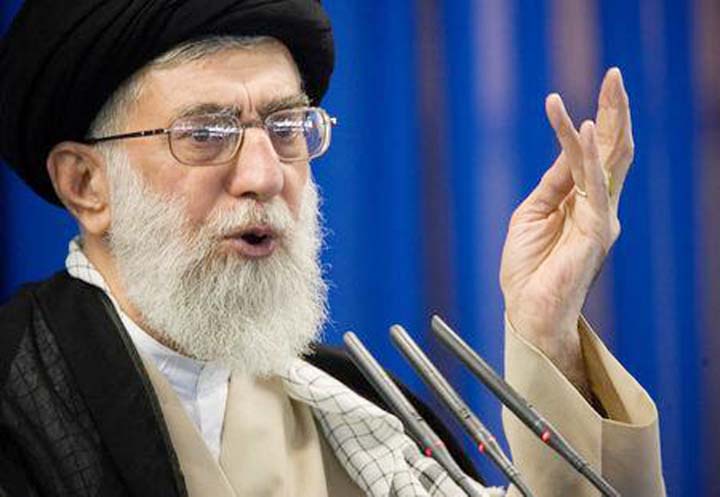
AFP, Tehran :
Iran’s supreme leader Ayatollah Ali Khamenei on Monday warned European leaders against their “dream” of Tehran continuing to curb its nuclear programme while finding itself under new economic sanctions.
“From some European countries we get the message that they expect the Iranian people to both tolerate the sanctions, deal with the sanctions, and go along with them and give up our nuclear energy activities and continue with the restrictions,” he told an audience in a Tehran suburb.
“I would tell these countries that they should be aware that this is a dream that will never come true.” Khamenei was speaking nearly a month after President Donald Trump announced the United States was pulling out of the landmark Iran nuclear deal.
The remaining partners-Britain, China, France, Germany and Russia-have scrambled to save the 2015 accord as the US readies to reimpose sanctions on Tehran.
“The people of Iran and the government of Iran will never tolerate both suffering from sanctions and nuclear restrictions,” said Khamenei.
“This will never happen,” he said during a ceremony to mark the 29th anniversary of the death of revolutionary leader Ayatollah Ruhollah Khomeini.
The Iran deal paved the way for the partial lifting of international sanctions against the country, in exchange for Tehran curbing its nuclear programme for a number of years.
Khamenei and various Iranian political figures have already warned that Iran could leave the agreement if it no longer receives the economic benefits it signed up for.
Late last month the supreme leader outlined Iran’s demands for it to stay in the nuclear deal. But the remaining backers of the accord have limited power to protect Iran’s economic interests in the face of US sanctions, with Trump showing little inclination to spare EU companies.
Shortly after Khamenei’s speech, French automaker PSA announced it was pulling out of two joint ventures to sell its cars in Iran owing to the US sanctions. Last week the chief executive of French oil giant Total-a symbol of foreign companies’ return to Iran after 2015 — said the chances of winning sanctions exemptions were “very slim”.
ANKARA (Reuters) – Iran’s top leader said on Monday he had ordered preparations to increase uranium enrichment capacity if a nuclear deal with world powers falls apart after the U.S. withdrawal, and he vowed never to accept limits on Tehran’s ballistic missile program.
Tensions between Iran and the West have resurged since President Donald Trump pulled the United States out of world powers’ 2015 nuclear deal with Tehran, calling it deeply flawed.
European signatories are scrambling to save the accord, which they see as crucial to forestalling an Iranian nuclear weapon, by seeking to ring-fence trade with Iran against new U.S. financial sanctions to dissuade Tehran from quitting the deal.
“Our enemies will never be able to halt our nuclear progress…It is their bad dream and will not happen,” Iranian Supreme Leader Ayatollah Ali Khamenei said in a televised speech.
In case European, Russian and Chinese signatories to the deal prove unable to protect its economic benefits for Iran, Khamenei said, “I have ordered Iran’s atomic energy agency to be prepared to upgrade our (uranium) enrichment capacity”.
He appeared to be hardening a threat to restore Iran’s disputed enrichment drive first made after Trump quit the nuclear deal.
One of Trump’s demands – which European allies support in principle – is new negotiations to rein in Iran’s ballistic missile program, which was not covered by the nuclear deal.
Khamenei again ruled this out. “Some Europeans are talking about limiting our defensive missile program. I am telling the Europeans, ‘Limiting our missile work is a dream that will never come true,” he said.
Under the deal, the Islamic Republic curbed its capacity to enrich uranium for nuclear fuel and in return won a lifting of most international sanctions that had hobbled its economy.

